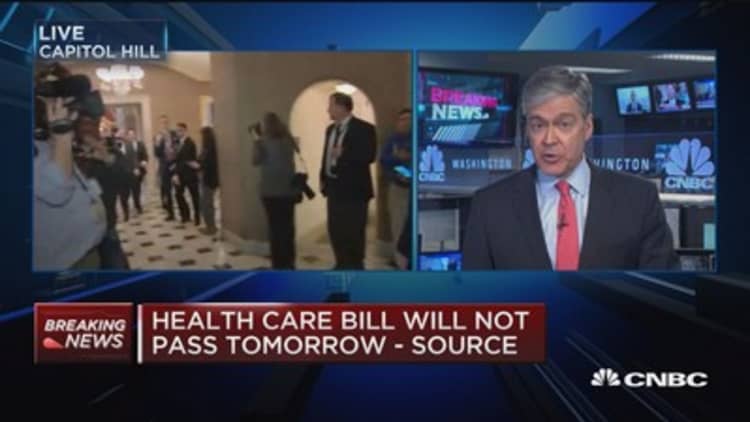
The revised Obamacare replacement plan being promoted by Congressional Republican leaders would not cause any bigger drops in the number of Americans with health insurance than the original bill, but would realize less budget savings, a new analysis released Thursday said.
The Congressional Budget Office projected that the revised GOP bill would realize $150 billion in reduced federal spending through 2026, which is less than half of the $337 billion in deficit reductions that the CBO had estimated for the bill's first version.
The difference in savings is largely the result of an amendment that would set a lower threshold for deducting medical expenses from income taxes.
But the newer version, like the first, is expected to lead to 14 million fewer people having health insurance in 2018, and 24 million fewer insured Americans by 2026 than would be covered if Obamacare remained as law in its current form.
In 2026, an estimated total of 52 million people nationally would lack health coverage if the revised bill becomes law, according to the CBO's projection.
However, if Obamacare remained in effect, 28 million Americans would not have insurance by that year, according to the CBO.
The revised bill also is projected to have the same effect on insurance premiums as the original Republican proposal, according to the non-partisan CBO.
Average premiums for single customers in the individual health plan market are still estimated to be 15 percent to 20 percent higher in 2018 and 2019 if the bill becomes law than would be the case under Obamacare.
But average premiums by 2026 are projected to be 10 percent lower than they otherwise would be under Obamacare, the CBO said.
The CBO's new report was issued about two hours after Republican leaders in the House of Representatives postponed a vote on an expected third version of the replacement bill due to their inability to convince enough members of the GOP caucus to support it, and ensure passage.
That version has not yet received a "score" from the CBO as the other two versions have because it is not yet finalized.
The second version, which was the subject of CBO's report on Thursday, was only introduced early this week by GOP leaders in an effort to drum up support for the replacement plan.
A number of conservative Republicans in Congress have opposed both versions of the GOP billl, saying they don't go far enough to repeal Obamacare.
The GOP bill would repeal the Obamacare mandate that requires most Americans to have insurance or pay a fine. It also would scale back the amount of subsidies the federal government provides to people who buy insurance on the individual market, and make changes in the way the government provides funding to states for their Medicaid programs.
The replacement plan also would undo several Obamacare taxes that affect wealthy people.
While those tax repeals would reduce revenue for the federal government, the loss of those axes would be more than offset by the reduced spending to help people afford their insurance coverage.
After the first version was publicly introduced, concerns were raised that the bill, due to the way it changed how subsidies were awarded to insurance customers, would lead to steep increases in premiums for people who are older, have lower incomes and live in rural areas.
GOP leaders then amended the bill to allow a lower income threshold for deducting the cost of medical expenses from income taxes.
The second version also repeals a set of Obamacare taxes this year as opposed to next year, allows states to impose work requirements for Medicaid, and also allows states to receive block grants for the Medicaid programs.


